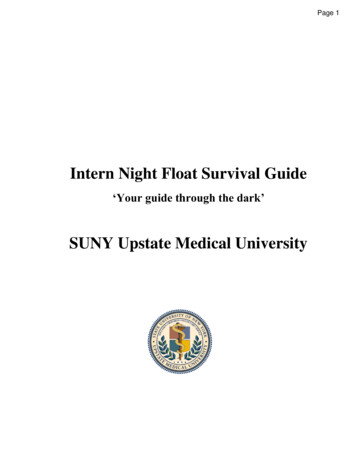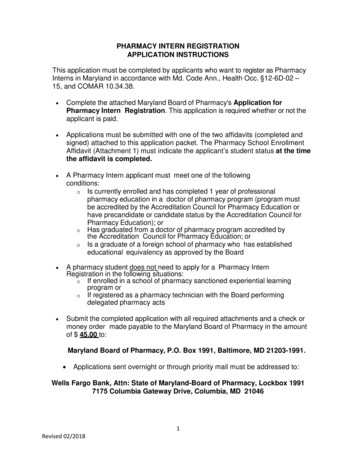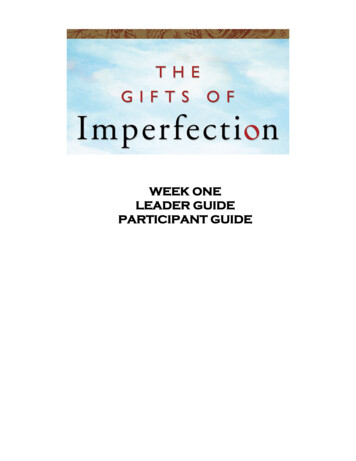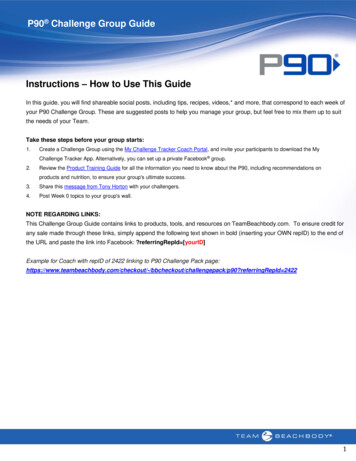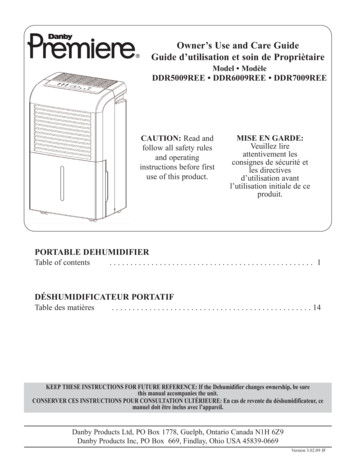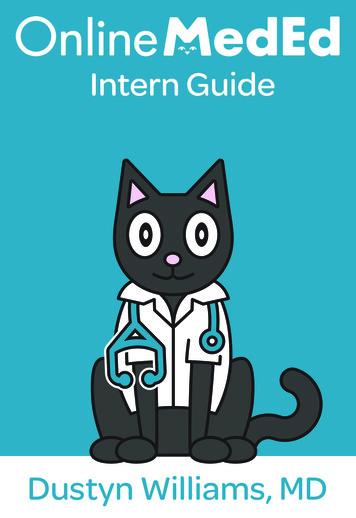
Transcription
Intern Guide
Table of Contents0.Prologuea. Introduction and disclaimerb. OnlineMedEd Storyc. Tier 1 Knowledge Topics for intern yeard. On Call Pearls23671.Philosophy and Bureaucracya. Philosophyb. Stages of Death and Dying in Residencyc. Duty Hoursd. The Team Cap Explainede. Morning Interdisciplinary Rounds (IDR)f. Stressg. Clinical Reasoningh. Errors in Clinical Reasoningi.Finite and Infinite Gamesj.Patient Satisfaction121316171819202223242.Survival Techniquesa. Time Management: Data Trackingb. Time Management: To Do Lists / Scut Listsc. Survival Skills: Morning Workflowd. Survival Skills: Urgent and Importante. Time Management: Turkeys and Windowsf. People Management: Relationshipsg. People Management: Being Effectiveh. People Management: Argumentsi.Life Management: In Your Boxj.Doing Questionsk. Studying Resources28313436384043444647483.Rounding and Documentationa. H&P: Spoken Presentationb. Daily Rounds: Spoken Presentationc. Documentation: Saying it Right (for CMS)d. H&P: Written Templatee. D/C Summary: Written Templatef. Ideal Admit Order Setg. Procedure Notesh. Transfer of Care / Step Down: Written Template5052535455565860
4.Medicationsa. Meds: Top 50b. Common Meds: Heart Relatedc. Common Meds: Lung Relatedd. Common Medications: Paine. Common Meds: Poop and Vomitf. Common Medications: Psych Medsg. Antibiotics626465666768695.Methodsa. Chest Painb. Shortness of Breathc. Abdominal Paind. Syncopee. Weaknessf. Fluid Where Fluid Shouldn’t Be (Swelling)g. Deliriumh. Hemoptysisi.Feverj.AKIk. Bleedingl.Dysphagiam. Back Painn. Headacheo. Joint Painp. Diarrheaq. Pulmonary Hypertensionr. ECG Interpretations. Cought. Acid Base and the Chamber of ommon Medical Problemsa. Cardiac Chest Painb. So you admitted that chest painc. Heart Failure In the Clinic – Outpatientd. Heart Failure In the Hospital – Inpatiente. Afibf. COPD Exacerbationg. Pulmonary Embolismh. Sepsisi.Principles of Antibiotic Managementj.Pneumoniak. Electrolytes - Sodiuml.Electrolytes - Potassiumm. Cirrhosisn. GI Bleed102103104105106107108109110111112113114119
o.p.q.r.s.Approach to LFTsInpatient DiabetesDiabetic KetoacidosisOutpatient DiabetesStroke1201211221241257.Intern Notesa. Cardiologyb. Pulmonaryc. Renal Nephrology Kidneyd. GI and Livere. Heme Oncf. Infectious Diseaseg. Endocrinologyh. Ua. Sick, Not Sick, On the Fenceb. Who Goes to the Unit?c. ARDS - Lung Protective Strategyd. Ventilator Strategye. Common Medications in the ICU:Sedation and Paralysisf. In the ICU: Approach to Shockg. In the ICU: Pressorsh. In the ICU: Septic Shocki.In the ICU: Running a Codej.In the ICU: Running a Rapid160162163164166168171172174175
PhilosophyFinite and Infinite GamesFinite and Infinite GamesIn your career to date you’ve been playing finite games. They have a start time, a stoptime, rules on how to play, and rules on how to win. That was the shelf, the USMLE Step2, the grade, and graduation. When playing finite games you have a role and see others asplaying their role. But people are not roles. They are people. They have feelings, emotions,and souls. Finite games crush people, and your "win" is often someone else's loss.Hopefully you developed survival skills. You might have “beaten the game” by figuring outwhat had to be done to get the A, the honors. And that’s great, because you survived. Butnow, more importantly than any point in your career, it’s time stop playing finite gamesand start playing infinite ones. The grade doesn't matter. People matter.Yes, residency has a start and end point, a set of rules, and a test to wrap it up - JUST LIKEWHAT YOU’VE DONE YOUR WHOLE LIFE. Yes, you can continue to play a finitegame and “win.” Pass the test, get through residency, and check the box.You’ll see people still in that mindset. They’re the ones avoiding consults, writing crapnotes, and treating people poorly. They’ll do the bare minimum to “win.” They’ll focus onMKSAP17 and only care about what’s “on the boards.”You don’t want to be this person. They WON’T be effective. And they will be miserable.In infinite games there are no end points, no winners, and no losers. These games don’thave roles – they have people. It’s the game you must now learn to play. If you haven’tplayed this way before, yes it will be challenging. But, it’s a transition you must make.Never again will you have as much support, supervision, and feedback as in residency.You will develop more in these three years than you have in your entire life so far. Neveragain will you grow this much. You get a taste of autonomy. Your signature matures. Yournotes carry weight. YOU matter. You will be forced to learn things you never wanted tolearn. You will take care of people you don’t want to take care of. But you’ll grow.THIS IS THE TIME TO LEARN and become EFFECTIVE. This game lasts the rest ofyour life. Now can’t be a time in life that you, “just get through to see the other side.” See people as people with emotions, souls, egos, and fears. You’ll be effective.See patients as people with emotions, souls, egos, and fears. You’ll be effective.See learners as people with emotions, souls, egos, and fears. You’ll be effective.The more effective you become during training, the more effective you will be in life. Youwon’t rise to some superhuman ability upon graduation; you’ll be reduced to your basestform of training. The further you rise, the more you learn, the better you are and the moreeffective you become now, the better you’ll be for the rest of your life.There is no winning or losing in residency– there’s only effectiveness in patient care.23
chapter 2: Survival TechniquesTime Management: Data TrackingThe Data Tracker is a means of taking every new patient from the ED to discharge. Itmakes daily rounding super easy. It lets H&Ps and Discharge Summaries flow. No moreclicking through 15 tabs while sitting there on the phone all confused. Move on fromempty Epic templates with meaningless information that no one wants or cares to see.Look like AND know what you’re doing.Find ours on the resources tab of the dashboard at onlinemeded.org (free, just register).Types of DataThere are two things you want on your data tracker: the static and the daily.The static data is the information that won’t change. Some of it should be obvious (name,date of birth, MRN, acct number, PmHx, PsHx, Soc Hx, All, FamHx, Home Meds), butsome may not. The major categories in the H&P form should go in the static data. But youalso want to include the big tests: major diagnostics, procedures, and past information.That’s going to change depending said diagnosis. This is where culture data, CT scans/ MRIs, echo results, cath results, etc. are going to go. It’s NOT part of the daily data (itwill be for one day) but you want it easily accessible at all times. You put the surgeries andprocedures here too. Finally, the day of presentation goes in the static data (the vitals,labs, and pertinent physical exam). This static data is the important info for the H&P andDischarge Summary.The daily data are the points you want to track: vitals, labs, meds etc. You want to be ableto track trends. It’ll let you see what happened day to day, better or worse. This is whereyou’re going to present from daily. Literally. On rounds, you will tell your story; youknow what the subjective and what the plan is. but how do you remember all those labsand vitals? You don't. Since you know the gist of what’s going on, you tell the story, thenyou look down at this tracker and read off the details, then continue the story. This is justto have the details written down to refer to later.Whatever you choose, ideally static data is on one side while daily data is on the other.An example, “the notecard” is shown on the next page.For meds you best get yourself a pencil. They change all the time. Every day you’re goingto sit in front of a computer. Every day you will run through the meds. Whatever you pick(I always liked separating scheduled from prn) the meds will be displayed in the sameorder every day. You just quickly go through and mark changes. And because medicationschange daily, you will either want to leave space and/or be able to erase meds or dosages.28
Time Management: Data TrackingSurvival29
Survival Skills: Morning WorkflowIt’s an awesome time saver to let autopopulating notes just autopopulate. They look stupid,which makes you look stupid. But it’s ok to do it, because it does save time. Still, do thissparingly. Make your stuff look good. For billing, for communication. Make it look like youactually wrote it and didn’t let a computer write it for you.6:30amarrive at the hospital and sit down at a computer terminal. Fill out data tracker.7:00ammorning report.8:00amsee patients.–– Dying: barring a crashing patient or someone you identified to be in troublebased on labs and vitals, you should be able to round freely and geographically.It’s about obtaining information at this point. If someone is in trouble, call yourupper level immediately.9:00amthe "other D’s"–– Diagnosis: put in orders NOW. aka early. Get ahead of the other resident teamswho will wait until after attending rounds to put their orders in.–– Discharge: inform social workers, nurses, and patient families that the personmight go home. If the plan yesterday was to discharge them today, activatethat discharge.–– Discuss: talk to your upper level resident about the plan for the day. Make sureyou’re ready for rounds and that a plan has been developed AND enacted.10:00am Attending Rounds–– The attending comes through and sees patients with you.–– Coaching happens.–– Plans are critiqued and uncertainties are laid to rest.12:00pm Work Time–– Do what came up on Attending Rounds.–– Save lunch for when the lines are short and the space abundant (go at 1, not 12).1:00 – 3:00pm Procedures and Meetings–– Set family discussions, paracenteses, thoracenteses, etc. for this time block.–– Use this time to start writing notes if there’s nothing else to do.3:00pm – 5:00pm Notes and New Patients–– Finish your notes by 4:00pm. The To-Do list should be mostly checked off.–– If you’re on Short or Long call, here’s where you’ll start to pick up new patientsfrom the ED. This time (1:00 – 5:00) can be sort of a jumble, depending onwhen patients come in.5:00pm – 7:00pm Go home or finish off your call.35SurvivalSAMPLE DAY
chapter 3: Rounding and DocumentationH&P: Spoken PresentationFirst Line: State the name, age, gender, and the chief complaint. LEAVE OUT past medical history Do include radicals and game changers (HIV, Transplant)First Paragraph: FAR COLDER Frequency, Associated Symptoms, Radiation, Character, Onset, Location, Duration,Exacerbating Factors, Relieving Factors Tell the attending the timing and characterization exactly as you have it. Give it unadulterated. Let the attending take a second crack at the complaint.Second Paragraph: This is, by far, the hardest concept to master. Say only what’s relevant.Third Paragraph: What the ED did and what response it had. You may not need this,but if it helps with the differential diagnosis or the understanding of the treatmentcourse, say it.Review of systems: DO NOT say the words, “review of systems.” DO NOT list anything inthe review of systems. Anything you thought relevant from the review of systems goes inthe second paragraph.The other stuff: PMHx, PSHx, Meds, Allergies, Social, Family Get through this as fast as possible; we can look it up later. Refer to it when if asked SOMETIMES stuff in here is relevant (debility now, functional status, or you think colon cancer and they had a colonoscopy), but most of the time it’s useless. Don’t say it.Physical Exam Vitals: Say the numbers. Not, “stable,” or, “within normal limits.” If they changed, say what they were on presentation followed by what theywere when you saw them. If no change, just say what they were at the time you saw them. Again, noranges during the H&P. Physical: Go top down, BUT Say only the things that alter the differential. POSITIVE if there and should be. NEGATIVE if not there and should be. LEAVE OUT the diatribe of normal findings. DO a thorough exam. DOCUMENT said thorough exam. SAY a relevant exam.50
Documentation: Saying it Right (for CMS)Documentation: Saying it Right (for CMS)Retaining CO2They have a low albumin ( 3)They have a really low albumin ( 2)The patient is weakThe patient is weak and from the ICUCHF exacerbationHeart FailureThe troponin elevated and you thinkit IS an NSTEMIThe troponin elevated and you thinkit is NOT an NSTEMIWhat you should write downSepsisSepsis secondary to urinary tract infectionAcute EncephalopathyAcute Renal FailureIntractable nausea and vomitingIntractable painFailure of outpatient therapyResolvingResolvedWorseningGrim prognosisAcute hypoxemic respiratory failureAcute (or chronic) Hypercapnic respiratory failureModerate protein calorie MalnutritionSevere protein calorie MalnutritionDebilityCritical Illness MyopathyAcute or Chronic [HEART FAILURE]with / without exacerbationSystolic/Diastolic Ischemic/NonischemicCardiomyopathy with an Ejection Fractionof [EF] New York Heart Association Class[1-4]NSTEMIDemand IschemiaWhatever you write in the discharge summary overrides and trumps everything youwrote, every day, for the entire stay.***** If they have something on day one (“sepsis”) they must have it on the dischargesummary or they never had it at all *****GET THE DISCHARGE SUMMARY RIGHT WITH THE RIGHT CMS LANGUAGE53RoundingWhat you mean to sayThere’s an infectionUrosepsisAltered Mental StatusAKINausea and VomitingPainFailure of outpatient therapyThe patient’s getting betterThe patient’s betterThe patient’s getting worseThe patient’s probably going to dieAny reason that they might need oxygen,in any way, at any time, for any reason.Nasal cannula, CPAP, Intubation, whatever
chapter 4: MedicationsMeds: Top 50DrugMinRouteFrequencyTypeNotesColac
The Data Tracker is a means of taking every new patient from the ED to discharge. It makes daily rounding super easy. It lets H&Ps and Discharge Summaries flow. No more clicking through 15 tabs while sitting there on the phone all confused. Move on from empty Epic templates with meaningless information that no one wants or cares to see. Look like AND know what you’re doing. Find ours on the .
